
Frankl wearing the
"Blue
Max,"Germany's
highest decoration
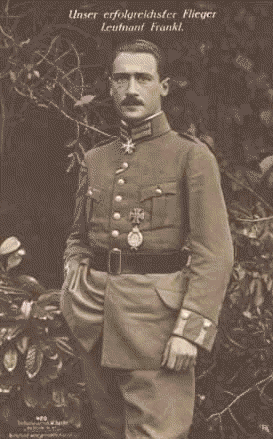
In a short amount of time Frankl shot down several enemy planes, and soon afterwards his picture was featured on German postcards and he was hailed as a national hero. Frankl received the Pour-le-mérite (nicknamed the "Blue Max"), which was Germany's equivalent to America's Medal of Honor. He was made commander of his own squadron, Jasta 4.
Frankl was killed on April 8, 1917, when the Albatros D.III he was flying fell apart during combat over France. Just three days before he had shot down three enemy aircraft in one day, for a total of 19. He was buried in Berlin-Charlottenburg, but his grave has been lost to war and history. Frankl was excluded from Pour-le-mérite Flieger, Walter Zuerl's 1938 chronicle of German World War I fighter pilots who had received the Pour-le-mérite. In spite of his conversion, Frankl apparently was, in Nazi eyes, still a Jew.
In 1973 the West German Luftwaffe named a squadron after him.
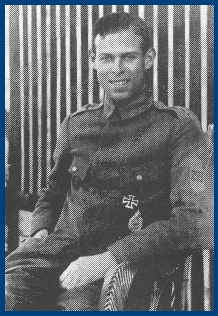
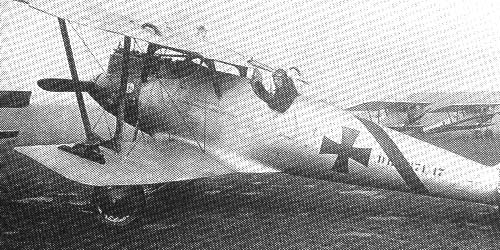
FRITZ BECKHARDT
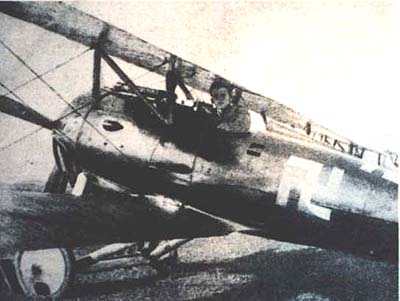
Berthold Guthmann was born in 1893 and had just started his university studies when the war started. He volunteered for military service, as did his two brothers (one of whom was killed at Verdun). He became an observer and gunner on military aircraft and received the Iron Cross (Second Class), the Tapferkeitsmedaille (Medal for Bravery), and the Verwundetenabzeichen (the German equivalent of the Purple Heart). After the war he became a prominent attorney in Wiesbaden. In addition to being the secular leader of the Wiesbaden community during its most difficult years (1938-1942), Guthmann was second in charge of the Frankfurt Jewish congregation during its final months (1942-1943).
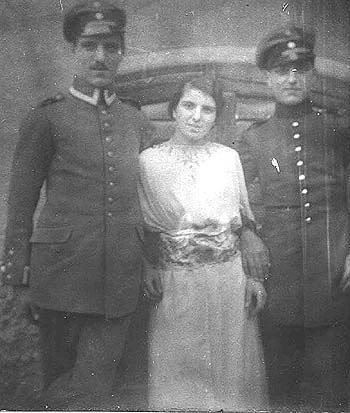
"Now the present troubles touch me deep in my heart.
A wish becoming unified, a single sacred longing,
An inspiration. Jews and Teutons-
That we are German, no proof is needed.
Because the Jews of their own volition gladly
Rally around the flag of their Fatherland.
For me to gain-be it, if it falls to my lot,
Even with my own blood-the Fatherland,
Which to myself and my brothers, alas, alas,
Often has been a Stepfatherland…."
Immanuel Saul (Translated by Adam M. Wait)
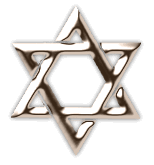
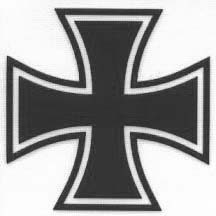
Immanuel Saul was a Jewish soldier in the German Army who was killed in World War I. Saul yearned in the poignant lines of his poem to finally gain Germany, even with his own death, as his Fatherland. Saul had hoped that the fact that so many Jews were willing to lay down their lives for Germany in World War I would inspire the nation to finally recognize and reward their longsuffering devotion.
It would never happen.
Jews and Communists were blamed for Germany losing the war. After the Nazi party came to power in Germany, Hitler immediately set upon making life as difficult as possible for German Jews. He first did this through anti-Semitic legislation designed to isolate Jews from the rest of society. Fritz Beckhardt, the Jewish pilot who had flown in World War I with a swastika on his plane, was imprisoned in a concentration camp because of his relationship with an "Aryan" woman. His old flying comrade, Berthold Guthmann, boldly appealed to Hermann Goering, Hitler's right-hand man, as a fellow flier and asked him to intercede on behalf of Beckhardt. Although Goering was the creator of the concentration camps (and the Gestapo), he granted Guthmann's request and released Beckhardt, who then left the country.
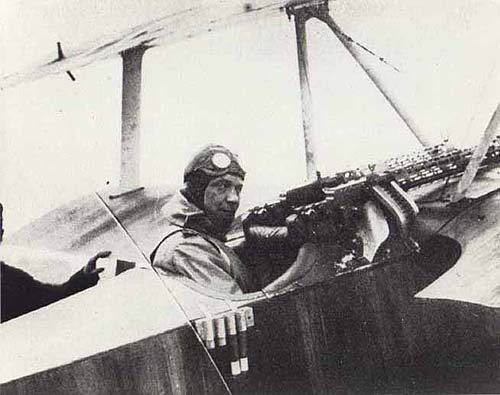
Hermann Goering as a World War I fighter pilot
After Hitler came to power, Willy Rosenstein found it difficult to fly. The Nazis made it very clear that he was not welcome at any flying fields. An old war comrade was in charge of one of the flying fields, however, and he refused to comply with Nazi orders that Jews were forbidden to fly. He allowed Rosenstein to use the field whenever he wished, but Rosenstein became concerned that his old comrade would soon get into serious trouble, so he stopped going to the flying field. Rosenstein decided that he and his family should get out of Germany, and although the Nazis did not want Jews in the country, they made it increasingly difficult for Jews to leave. When German Jews tried to emigrate, the government taxed so much of their money and property that in most cases there was not enough left to buy a passage to another country or to provide a means for making a living. Rosenstein was running into all kinds of Nazi bureaucratic roadblocks as he tried to leave the country. A man Rosenstein had barely known from his days in Goering's squadron told Rosenstein he would inform Goering of his dilemma. Considering the circumstances under which he had left Goering's squadron, Rosenstein expected no help. To Rosenstein's great surprise, Goering sent him a letter that he admits "made things easier in some ways," because he was allowed to leave the country and take three planes and their spare parts with him, "a privilege which was not granted to other Jews at that time [summer 1936]."
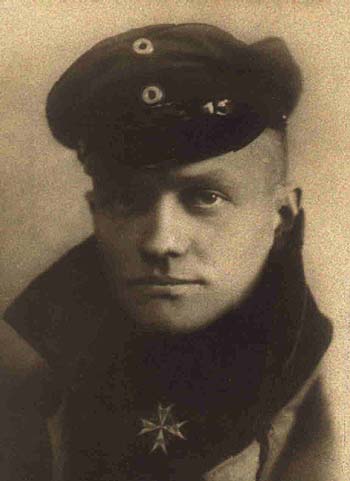
Berthold Guthmann once said that Richthofen was like "an umbrella that gave all the German pilots a covering of fellowship and chivalry," and Hermann Goering, in the case of Rosenstein and Beckhardt, was loyal to the brotherhood of fliers.
Unfortunately, a new kind of chivalry was rising up in Germany, one that was being developed by Reichsführer Heinrich Himmler. Himmler was obsessed with tales of knights and Camelot, but he wanted a uniquely German brand of chivalry. In the First World War, Richthofen had described the chivalry of fliers as: "A chivalrous battle with similar weapons, each with a machine gun, an airplane, and some athletic ability; only the heart remains to be weighed."
Himmler's knights would have no heart; they would glory in showing no mercy and no fairness. Himmler wanted a chivalry stripped of Jews and Jewish values. Medieval chivalry had been based upon Biblical principles of mercy and defense of the weak, especially women and children. Old Biblical principles had to be done away with if Nazi knights were going to fulfill their mission of killing the weak and defenseless. Ironically, Jewish values were removed from ideals of German chivalry in order to make it easier for Germany's new knights - the SS - to destroy the Jews.
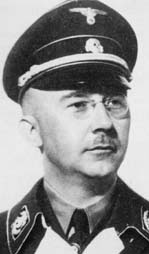
Berthold Guthmann had served Germany faithfully in its fledgling air force during World War I, but that made no difference to the Nazis. He was not seen as a German, a veteran, or a human being. In 1943 Guthmann and his family were arrested, split up, and sent to various concentration camps. Although Guthmann had saved Beckhardt's life a few years earlier through his plea to Hermann Goering, no one interceded on Guthmann's behalf, and he was killed at Auschwitz (gates, below) as if he had been nothing more than an insect.
Ironically, when Theilhaber wrote his book on Jewish fliers in 1924, he lamented at the end the suffering that had already been inflicted upon Jews through the symbol of the swastika, which he called "the emblem of all Jew-haters." He had no idea the worst was yet to come.
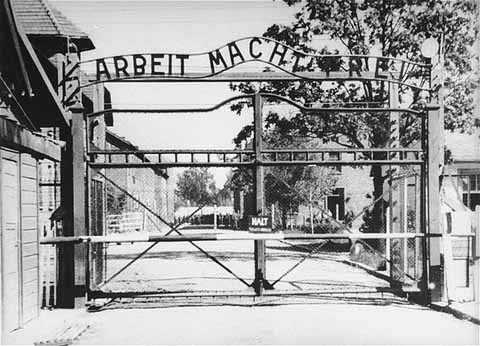
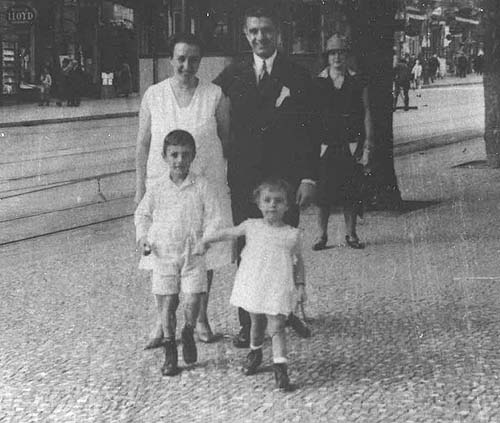
This site is dedicated to the memory of Germany's Jewish airmen of the First World War:
|
|
Ltn. Abrahamson |
|
Ltn. Fritz Gerstle |
|
Ltn. Erich Lewy |
|
? Rosin (brother of Franz) |
|
|
Rudolf Abt |
|
Paul Goldmann |
|
Jakob Lichtenstein |
|
Ltn. Franz Rosin |
|
|
Ltn.d.R. Ernst Adler |
|
Gruner |
|
E. Liebmann |
|
Hans Rothschild |
|
|
Vzfw. Amrhein |
|
Alfred Grünfeld |
|
Uffz. Arnold Lilienthal |
|
Ltn. Friedrich Rüdenberg |
|
|
Ltn. Aronheim |
|
Berthold Guthmann |
|
Alexander Lippmann |
|
Rumpler |
|
|
Ltn. Hermann Back |
|
Fritz Haas |
|
Obltn.d.R. Alwin Lippmann |
|
Flugobermaat Rund |
|
|
Ltn.d.R. Leopold Ballin |
|
Hansdorf |
|
Dr. phil. Lissauer |
|
Gustav Samuel |
|
|
Albert Bär |
|
Ltn.d.R. Walter Hauk |
|
Uffz. Hans Lustig |
|
Ltn.d.R. Ernst Schäffer |
|
|
Vzfw. Fritz Beckhardt |
|
Georg Hecht |
|
Artur Macholl |
|
Richard Scheuer |
|
|
Fritz Benario |
|
Wilhelm Heilbrunn |
|
Ltn. Adolf Marx |
|
Albert Scheyersen |
|
|
Karl Berger |
|
Siegfried Heimann |
|
Ltn. Mayer |
|
Heinrich Schiller |
|
|
H. R. Berliner |
|
Hemmerdinger |
|
Ltn.d.R. Fritz Mecklenburg |
|
Hermann Schmidt |
|
|
Ltn.d.R. Benno Berneis |
|
Edgar Hirsch |
|
Reg. Baum. Meyer |
|
Ltn. Oskar Seligmann |
|
|
Vzfw. Bett |
|
Wilhelm Hirschfeld |
|
Ltn. Michelbacher |
|
Seligsohn |
|
|
Ltn.d.R. Heinz Bettsak |
|
Ltn. Max Holzinger |
|
von Mises |
|
Hermann Sommerfeld |
|
|
Hans Bielschowsky |
|
Hopp (son of Gustav) |
|
Moser (son of August) |
|
Paul Spiegel |
|
|
Martin Bloch |
|
Ltn. Martin Jacobowitz |
|
Ltn.d.R. Ernst Müller |
|
Ltn. Paul Stadthagen |
|
|
Ltn. Otto Erich Bloch |
|
Oberarzt d.R. Hermann Jaffé |
|
Haupt. Neuberg |
|
Ernst Steinitz |
|
|
Hans Block |
|
Ltn. Bertold Jessel |
|
Uffz. Alfred Neufeld |
|
Ltn.d.R. Max Strauss |
|
|
Ltn. Ewald Blumenthal |
|
Ltn. Hermann Jonas |
|
Adolf Neumann |
|
Martin Sultan |
|
|
Uffz. Cassel |
|
Alfred Kann |
|
Kurt Neumann |
|
Unger |
|
|
Arthur Chasanowicz |
|
Hugo Kaplan |
|
Otto Neumann |
|
Warschauer |
|
|
Max Cohn |
|
Kohnert |
|
Richard Neumann |
|
Wechsler |
|
|
Rudolf Cohn |
|
Ltn. Kurt Königsberger |
|
Siegfried Nossek |
|
Ltn.d.R. Ernst Weil |
|
|
Hermann Elias |
|
Fritz Koppel |
|
Alfred Odenheimer |
|
Vzfw. Kurt A. Weil |
|
|
Max Elias |
|
Bertold Krämer |
|
Bruno Offenbacher |
|
Paul Wertheim |
|
|
Erich Eliel |
|
Paul Künstler |
|
Erich Oswald |
|
Ltn. Alex Wetzlar |
|
|
Rudolf Engel |
|
Ltn. Kurt Lämmle |
|
Ltn.d.R. Max Pappenheimer |
|
Ltn. Siegfried Witkowski |
|
|
Ltn.d.R. Alfred Falk |
|
Ltn. Wilhelm Langstadt |
|
Perlhöfter |
|
Ltn. Jacob Wolff |
|
|
Ltn. Wilhelm Frankl |
|
Offz. Stellv. Jakob Ledermann |
|
Ltn.d.R. Simon Pinczower |
|
Ltn. Wilhelm Wolff |
|
|
Obltn. Hans Friedländer |
|
Ltn. Leopold |
|
Vzfw. Alfred Regensburger |
|
Ltn.d.R. Josef Zürndörfer |
|
|
Karl Fromm |
|
Ltn. Lessing |
|
Edgar Rosenbaum |
|
Obltn.d.R. Benno Öttinger |
|
|
Walter Fromm |
|
Eugen Levi |
|
Flugobermaat Rosenberger |
|
|
|
|
|
|
Ltn. Lewy |
|
Ltn.d.R. Wilhelm Rosenstein |
|
|
If you have any information on Germany's Jewish airmen in World War I that you would like to share with us, please contact us at jewishknights@aol.com.
SOURCES
Badinger, James. "Jewish Quandary," online at http://judischequandry.tripod.com.
Cook, Stephen, and Stuart Russell. Heinrich Himmler's Camelot: The Wewelsburg Ideological Center of the SS, 1934-1945. Kressmann-Backmeyer, 1999.
Doerflinger, Joseph. Stepchild Pilot. Tyler, Texas: Longo, 1959.
"Felix Theilhaber." Online article at http://www2.rz.hu-berlin.de/sexology/GESUND/ARCHIV/COLLTHE.HTM.
Gavish, Dov, and Dieter H.M. Groschel. "Leutnant der Reserve Friedrich Rüdenberg." Over the Front, Summer 2001, pp 99-132.
Gill, Robert B. "The Albums of Willy Rosenstein: Aviation Pioneer, Jasta Ace." Cross and Cockade, Winter 1983, pp 289-334.
Keen, Maurice. Chivalry. New Haven: Yale UP, 1984.
Kilduff, Peter. Letter to Robin Smith, Sept. 4, 1996.
Opfermann, Charlotte. The Art of Darkness. University Trace Press, 2002.
Over the Front, Journal of the League of World War I Aviation Historians, online at http://www.overthefront.com.
Pourlemerite.org at http://www.pourlemerite.org/index.html.
Richthofen, Manfred von. "Der rote Kampfflieger." Ein Heldenleben. Berlin: Ullstein, 1920.
Smith, Robin D. Last Knight, First Ace: The Red Baron as Legend and Myth. Master's thesis, Wright State University, 2000.
Theilhaber, Felix A. Jewish Flyers in the World War. Trans. Adam M. Wait. N.p., 1988.
Theilhaber, Felix A. Jüdische Flieger im Weltkreig. Berlin: Verlag der Schild, 1924.